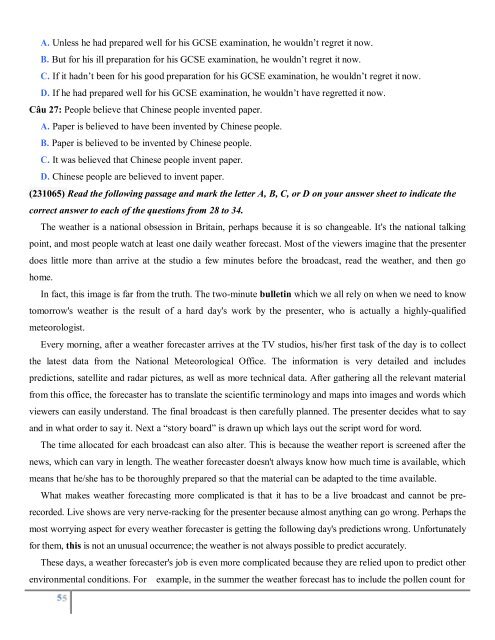12 đề thi thử THPT Quốc gia môn tiếng Anh năm 2018 có lời giải chi tiết
https://app.box.com/s/nnfa5e7e8wjt4ogw5c12nscparzxshyv
https://app.box.com/s/nnfa5e7e8wjt4ogw5c12nscparzxshyv
Create successful ePaper yourself
Turn your PDF publications into a flip-book with our unique Google optimized e-Paper software.
A. Unless he had prepared well for his GCSE examination, he wouldn’t regret it now.<br />
B. But for his ill preparation for his GCSE examination, he wouldn’t regret it now.<br />
C. If it hadn’t been for his good preparation for his GCSE examination, he wouldn’t regret it now.<br />
D. If he had prepared well for his GCSE examination, he wouldn’t have regretted it now.<br />
Câu 27: People believe that Chinese people invented paper.<br />
A. Paper is believed to have been invented by Chinese people.<br />
B. Paper is believed to be invented by Chinese people.<br />
C. It was believed that Chinese people invent paper.<br />
D. Chinese people are believed to invent paper.<br />
(231065) Read the following passage and mark the letter A, B, C, or D on your answer sheet to indicate the<br />
correct answer to each of the questions from 28 to 34.<br />
The weather is a national obsession in Britain, perhaps because it is so changeable. It's the national talking<br />
point, and most people watch at least one daily weather forecast. Most of the viewers imagine that the presenter<br />
does little more than arrive at the studio a few minutes before the broadcast, read the weather, and then go<br />
home.<br />
In fact, <strong>thi</strong>s image is far from the truth. The two-minute bulletin which we all rely on when we need to know<br />
tomorrow's weather is the result of a hard day's work by the presenter, who is actually a highly-qualified<br />
meteorologist.<br />
Every morning, after a weather forecaster arrives at the TV studios, his/her first task of the day is to collect<br />
the latest data from the National Meteorological Office. The information is very detailed and includes<br />
predictions, satellite and radar pictures, as well as more technical data. After gathering all the relevant material<br />
from <strong>thi</strong>s office, the forecaster has to translate the scientific terminology and maps into images and words which<br />
viewers can easily understand. The final broadcast is then carefully planned. The presenter decides what to say<br />
and in what order to say it. Next a “story board” is drawn up which lays out the script word for word.<br />
The time allocated for each broadcast can also alter. This is because the weather report is screened after the<br />
news, which can vary in length. The weather forecaster doesn't always know how much time is available, which<br />
means that he/she has to be thoroughly prepared so that the material can be adapted to the time available.<br />
What makes weather forecasting more complicated is that it has to be a live broadcast and cannot be prerecorded.<br />
Live shows are very nerve-racking for the presenter because almost any<strong>thi</strong>ng can go wrong. Perhaps the<br />
most worrying aspect for every weather forecaster is getting the following day's predictions wrong. Unfortunately<br />
for them, <strong>thi</strong>s is not an unusual occurrence; the weather is not always possible to predict accurately.<br />
These days, a weather forecaster's job is even more complicated because they are relied upon to predict other<br />
environmental conditions. For example, in the summer the weather forecast has to include the pollen count for<br />
5

















